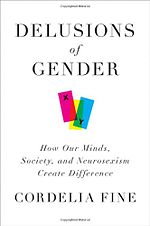- Delusions of Gender
-
Delusions of Gender:
How Our Minds,
Society, and Neurosexism
Create Difference
Author(s) Cordelia Fine Subject(s) Sex and intelligence Genre(s) Non-fiction Publisher W. W. Norton & Company Publication date August 30, 2010 Media type Print (Hardcover and Paperback) Pages 338 ISBN 0393068382 Delusions of Gender: How Our Minds, Society, and Neurosexism Create Difference is a book by Cordelia Fine published in 2010 which criticizes current evidence for innate biological differences between men and women's minds as being faulty and exaggerated, and argues that cultural and societal beliefs contribute to commonly perceived sex differences.
Contents
Contents
In the first part of the book, "'Half Changed World', Half Changed Minds", Fine argues that social and environmental factors strongly influence the mind, making many conclusions about innate gender differences dubious. She also discusses the history and impact of gender stereotypes and the ways that science has been used to justify sexism. The second part of the book, "Neurosexism," Fine criticizes the current available arguments and studies supporting sex differences in the mind in order to debunk them, focusing on methodological errors and logical gaps. In the third part of the book, "Recycling Gender," she argues that the use of faulty science to justify gender stereotypes can negatively impact future generations.
Reception
Delusions of Gender has generally received positive reviews, and has been praised by the New York Times, The Wall Street Journal, USA Today, and Newsweek for having strong arguments and convincing analysis.[1][2][3][4] In the New York Times review, Katherine Bouton wrote, "Her sharp tongue is tempered with humor and linguistic playfulness." However, Newsweek wrote, "Fine’s prose is highly sourced, and heavy. It’s more work than fun," though they praised her argument and evidence as "solid."
Simon Baron-Cohen, whose work is heavily criticized by Fine in Delusions of Gender, reviewed the book in The Psychologist. In it, he responded to Fine's criticisms of the studies in which he had been involved and criticized the book as "fusing science with politics," writing, "Her barely veiled agenda, in this long, scholarly book, is to show that any sex difference found in humans can be made to vanish!" [5] Fine responded in a published letter to The Psychologist arguing that there were still flaws in Cohen's study that he did not adequately address, and defended her positions in the book as scientific and not political. [6] Diane Halpern, whose paper "The Science of Sex Differences in Mathematics and Science" is also criticized by Fine in Delusions of Gender, reported mixed feelings about the book, arguing that it was "strongest in exposing research conclusions that are closer to fiction than science...and weakest in failing to also point out differences that are supported by a body of carefully conducted and well-replicated research." [7]
See also
Related books
- Brain Storm: The Flaws in the Science of Sex Differences by Rebecca M. Jordan-Young
- Pink Brain, Blue Brain: How Small Differences Grow Into Troublesome Gaps -- And What We Can Do About It by Lise Eliot
References
- ^ http://www.nytimes.com/2010/08/24/science/24scibks.html
- ^ http://www.washingtonpost.com/wp-dyn/content/article/2010/09/10/AR2010091002678.html
- ^ http://www.usatoday.com/tech/science/columnist/vergano/2010-08-08-brain-scans-sexes_N.htm
- ^ http://www.newsweek.com/blogs/we-read-it/2010/09/01/delusions-of-gender-how-our-minds-society-and-neurosexism-create-difference.html
- ^ http://issuu.com/thepsychologist/docs/psy1110/15
- ^ http://www.cordeliafine.com/Fine_Response_Psychologist_December_2010.pdf
- ^ http://www.sciencemag.org/content/330/6009/1320.full
External links
Categories:- Psychology books
- Neuroscience books
- Gender
- Neuroscience
- Non-fiction books
Wikimedia Foundation. 2010.
